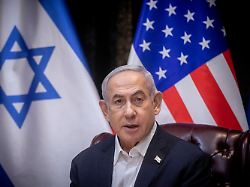“Israel would lose otherwise”
Netanyahu sticks to Rafah offensive
February 17, 2024, 9:12 p.m
The international appeals are not stopping Israel from expanding its military operations in the south of the Gaza Strip. Otherwise his country would lose the war, explains Prime Minister Netanyahu. Even if there is a hostage agreement, he wants to carry out the offensive in Rafah.
Israeli Prime Minister Benjamin Netanyahu has confirmed, despite international warnings, that an Israeli military offensive will also take place in Rafah in the southern Gaza Strip. “Of course only after we make it possible for civilians in the combat zones to move to safer areas,” Netanyahu told reporters in Jerusalem. He emphasized that they would not bow to international pressure on the issue. “Anyone who wants to prevent us from operating in Rafah is ultimately telling us ‘lose the war’.” He won’t allow this.
The head of government said the offensive would also take place in the event of an agreement with Hamas to release the Israeli hostages. Even if such an agreement is reached, “we will move into Rafah.”
Israel is preparing a military offensive on the city of Rafah, which borders Egypt, in order to take action against the Islamist Hamas there too. Hundreds of thousands of internally displaced people have sought protection in the town in the south of the Palestinian territory. The plans to expand Israeli operations in the overcrowded city have met with great international criticism. The USA had also warned against this. Federal Foreign Minister Annalena Baerbock had called for the establishment of long-term safe places for the people there.
Netanyahu doesn’t want to be dictated to
The Israeli operation in the Gaza Strip was triggered by the unprecedented massacre that terrorists from Hamas and other extremist groups carried out in Israel on October 7th. On the Israeli side, around 1,200 people were killed. Israel responded with massive air strikes and a ground offensive.
Netanyahu confirmed that they would “settle the score” with the Hamas leadership. This is only a matter of time. There will be no dictates from international parties on the question of a future peace settlement with the Palestinians. “A settlement can only be achieved through direct negotiations between both sides without preconditions,” he emphasized.
Netanyahu also responded to media reports that the United States and other allies could recognize a Palestinian state without Israeli consent. Israel under his leadership will vehemently resist such a “unilateral recognition of a Palestinian state,” said the head of government.
Allies urge moderation
At the security conference in Munich, allies wanted to persuade Israel to change its stance with the prospect of better relations with its Arab neighbors. Israel has “an extraordinary chance” for a more peaceful future if it seeks understanding with its Arab neighbors, said US Secretary of State Antony Blinken. Top diplomats from Europe, the USA and Arab states had previously met in Munich to talk about ways out of the war. Meanwhile, Israel’s military continued to attack suspected targets of the radical Islamic Hamas in the Gaza Strip and arrested numerous people in the last functioning hospital in the Gaza Strip.
Recently there were reports that the Saudi Arabian government was holding out the prospect of recognizing Israel if the government in Jerusalem made a Palestinian state possible. There are also discussions about reforming the Palestinian Authority, which is viewed by the West as the legitimate representative of the Palestinians, especially in the West Bank. “This is a path that is difficult, but that is possible,” said Blinken about the two-state solution, which is more urgently needed than ever. “The alternative would be to repeat the vicious circle over and over again,” he warned. Then Israel would have to expect another attack in five or ten years.
Blinken, Chancellor Olaf Scholz and Baerbock assured Israel of continued support in the fight against Hamas in Munich. However, there were increasing calls from numerous states that Israel must, on the one hand, provide better care for the Palestinian civilian population in the Gaza Strip and, on the other hand, pave the way to a ceasefire. Scholz also warned that Israel must prevent attacks by radical Jewish settlers in the West Bank and should not expand the war to Lebanon.
